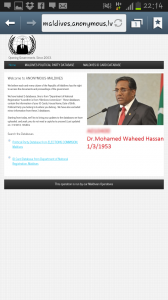Speaking at a campaign rally in Haa Alif Atoll Dhidhoo Island, former president and Maldivian Democratic Party (MDP) presidential candidate Mohamed Nasheed has called on his rivals to compete in elections instead of using the courts to obstruct presidential polls and disqualify MPs from the parliament.
Nasheed’s comments follow the Supreme Court’s stripping of MDP MP Ali Azim and MDP aligned Dhivehi Rayyithunge Party (DRP) Mohamed Nashiz of their seats, and the Criminal Court’s sentencing in absentia of MDP MP Hamid Abdul Ghafoor to six months in jail for disobedience to order.
Progressive Party of the Maldives (PPM) council member Ibrahim ‘Wadde’ Waheed is seeking the disqualification of DRP Leader and MP Ahmed Thasmeen Ali’s seat, citing his failure to pay decreed debt as per a 2010 court verdict.
Presidential polls have been set for November 9 after the Supreme Court annulled the first round of presidential elections held on September 7 and the police obstructed the Supreme Court ordered revote on October 19 after the JP and PPM refused to approve the voter registry.
“Our rivals do not know elections,” Nasheed said, adding that the only time his rivals had participated in elections was the multi-party elections of 2008 in which the MDP had defeated 30-year ruler Maumoon Abdul Gayoom.
Instead of campaigning and strengthening their political parties, rival PPM and Jumhooree Party were inciting hatred and engaging in back biting, Nasheed alleged.
“These people are a group, in other words a gang. There is no way they can participate in peaceful political activities,” he added whilst calling on PPM’s Abdulla Yameen and JP’s Gasim Ibrahim to compete in presidential elections.
Nasheed emphasized that the constitution exists to protect the citizenry’s rights, and that the judiciary, executive and legislature existed to uphold these rights.
“It is always, we, the citizens, who will say the last word in the Maldives,” he said.
Neither MDP nor EC want a vote: Gasim
Meanwhile, the JP’s Gasim Ibrahim has accused the Elections Commission (EC) of collaborating with Nasheed to obstruct free and fair polls on November 9.
“Neither the MDP nor the Elections Commission want to hold a vote. I accuse the Election Commission of doing things according to MDP’s wishes. I hear [the EC] does things the way Kenereege Mohamed Nasheed wants,” Gasim said at a press conference on Sunday.
The JP had sought and won an annulment of the first round of president held on September 7 at the Supreme Court, after narrowly placing third in the polls. Since then, the JP has continued to accuse the EC of fraud and tampering with the voter registry.
The EC wants Speaker Abdulla Shahid to assume the presidency at the end of the current presidential term on November 11 and hold polls afterwards, Gasim alleged.
“[T]hey want Abdulla Shahid to assume the presidency and then do this [hold election]. I think that is their spirit. This does not come as a surprise,” he told the press.
The Majlis last week passed a resolution to hand over presidency to the Speaker in the absence of a president elect on November 9. JP and the PPM boycotted the vote.
If no candidate gains over 50 percent in the November 9 polls, a second round is scheduled for November 16, five days after the end of the presidential term.
According to local media, Gasim has also said he favors a military takeover to Speaker Shahid assuming the presidency. He has called for President Dr Mohamed Waheed to continue beyond his term.
“Is it better for a man who is selected to assume the presidency? Or the Military? What is the difference? On one side they are stealing [the presidency] and doing things outside the law. Isn’t it better that our military takes over the country to save the country and maintain peace? It is their responsibility to ensure safety and peace in this country,” Channel News Maldives (CNM) quotes Gasim saying at a press conference on October 31.
The November 9 election is the EC’s fourth attempt to hold presidential polls. When the JP sought the vote annulment, the EC had scheduled a second round for September 28. With a verdict pending on the eve of elections, the EC decided to proceed with polls the next day.
However, the Supreme Court issued an injunction ordering the security forces to halt election preparations. Shortly afterwards, on October 7, the court annulled the September 7 polls and delineated 16 guidelines to hold polls by October 20.
The guidelines required all presidential candidates to sign the voter registry. However, with the JP and PPM refusing to sign the registry, the police stopped the election an hour before polls were to open.
Gasim on Saturday reiterated that he was ready to approve the voter registry if it was compiled properly. However, he alleged the EC had accepted reregistration forms with fingerprints like “a blot of ink.”
